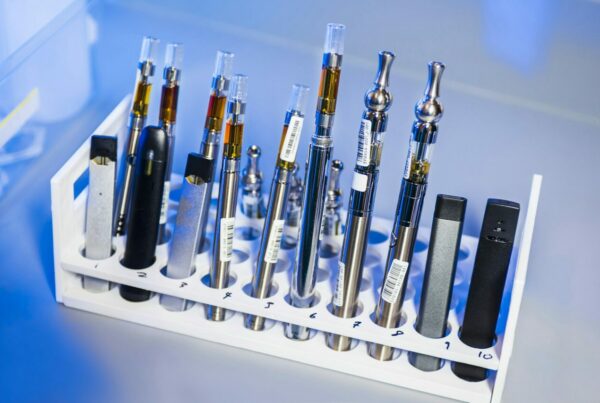N, N-Dimethyltryptamine, commonly known as DMT, is a compound that naturally occurs in both plants and animals, and is known for its intense, yet short-lived, psychedelic effects when ingested.
Emerging research suggests that DMT, which is produced naturally in the body, plays important roles in both the peripheral and central nervous systems and may even serve as a neurotransmitter.
While DMT is capable of producing strong psychedelic effects, it typically doesn’t result in significant adverse effects, with the exception of potential cardiovascular issues when large doses are administered via injection.
Let’s explore DMT and its wide-ranging roles, from its recreational use to its promising potential in scientific research and therapeutic applications.

A Brief Introduction to DMT: What is it?
| Aspect | Details |
| Name | N, N-Dimethyltryptamine (DMT) |
| Classification | Indole alkaloid |
| Occurrence | Found naturally in a variety of plants and animals |
| Psychoactive Effects | Produces intense, but short-lived psychedelic experiences when ingested. |
| Method of Consumption | Can be smoked, injected, or taken orally. |
| Duration of Effects | Effects are short-lived, typically lasting from 5 to 30 minutes. |
| Chemical Structure | Comprises a tryptamine core with two methyl groups attached to the amine nitrogen atom. |
| Metabolism | Rapidly metabolized by the body, broken down by monoamine oxidase (MAO). |
| Cultural Use | Historically used in various ceremonial and shamanic rituals by indigenous cultures. |
| Other names | Dimitrifantasiabusinessman’s trip, Businessman’s special, 45-minute psychosis, spiritual molecule |
The Role of DMT in Mental Health
N, N-Dimethyltryptamine (DMT), a compound revered for its potent psychedelic effects, is drawing attention for its potential benefits to mental health. Despite its conventional image as a trigger for intense visionary experiences, recent research suggests a connection between DMT and mental well-being.
Effects on Psychological and Emotional Well-being
DMT, known for its potent psychedelic effects, can induce deep emotional reactions and altered states of consciousness. These qualities hold the potential for novel therapeutic approaches to mental health concerns, facilitating emotional processing, and granting new perspectives on personal traumas.
Neuroplasticity and Brain Function
Research suggests DMT may influence neuroplasticity, thereby enhancing the brain’s ability to change and reorganize itself. Understanding its impact on synaptic plasticity and neural connectivity may unveil potential treatments for disorders rooted in neural maladaptation.
Potential Therapeutic Use for Mental Health Disorders
Initial studies underscore DMT’s potential therapeutic use for conditions such as depression, addiction, and PTSD. Its propensity to induce mystical or spiritual experiences could offer a unique pathway to psychotherapy and help reshape negative thought patterns.
Investigating the natural presence of DMT within the body has highlighted its significance in promoting mental health resilience, moderating stress response, and fostering overall psychological well-being. Understanding how the body controls internal DMT levels could usher in new therapeutic strategies.
DMT and Mental Health Disorders
| Disorder in Mental Health | Definition | DMT’s Effectiveness | Benefits |
| Depression | Defined as a mood disorder featuring persistent sadness, lack of interest, and reduced motivation | Preliminary research suggests DMT could alleviate symptoms through inducing deeply emotive experiences. | Its rapid onset and ability to evoke transformative experiences may present novel, effective therapeutic approaches to reshape negative thought patterns and enhance emotional processing |
| Post-Traumatic Stress Disorder (PTSD) | A mental health disorder triggered by traumatic events, resulting in flashbacks, intense anxiety, and intrusive thoughts | Emerging research indicates DMT’s potential to manage symptoms by prompting spiritual or mystical experiences, thereby helping patients reframe traumatic memories | DMT’s ability to induce altered states of consciousness could assist in facilitating emotional processing and offering fresh perspectives on traumatic experiences |
| Addiction | A complex disorder characterized by compulsive engagement in rewarding stimuli, irrespective of negative consequences | Certain studies suggest DMT’s potential in disrupting addictive behaviors and diminishing cravings for substances | DMT’s capacity to trigger profound and transformative experiences may assist individuals in altering their behavioral patterns and addressing underlying factors of their addiction |
Approach toUtilizing DMT
DMT, renowned for evoking short-lived yet powerful psychedelic experiences, has various methods of use. The chosen method often depends on the user’s desired intensity and duration of the experience.
Smoking:
DMT, when smoked in a pipe or vaporized, necessitates meticulous temperature control to avoid overheating and burning the compound. The psychedelic experience starts almost instantaneously when DMT is smoked, usually lasting between 5 to 15 minutes.
Oral Intake:
Oral consumption of DMT leads to slower onset effects, which last significantly longer, often for a few hours. This is due to the slower metabolization of DMT when combined with an MAOI.
Injection:
DMT can be directly injected into the bloodstream for immediate and powerful effects.
This method triggers an immediate and potent experience, but it demands precise dosage and carries higher risks.
Insufflation (Snorting):
Snorting DMT results in a slower onset of effects compared to smoking, but potentially provides a longer-lasting experience.
Sublingual or Buccal Administration:
When absorbed through the oral mucosa, this method offers an alternative to smoking and delivers a longer, though less intense, experience.
Determining Therapeutic Dosage: N, N-Dimethyltryptamine (DMT)
For smoking, the suggested dosage ranges from 20 to 40 mg, while for intravenous use, the recommended dosage is 0.2 to 0.4 mg per kg of body weight. These dosage recommendations are predominantly relevant to clinical research and are particularly pertinent for intravenous use.
- Higher doses administered intravenously are associated with intense visuals, temporary loss of control, and a combined state of anxiety and euphoria
- Interestingly, lower doses have demonstrated less desirable effects
- Recreational doses of smoked DMT typically range from 40 to 50 mg, sometimes even reaching up to 100 mg
- Different doses of intravenous Users have reported significant, enduring enhancements in psychological well-being after experiencing near-death episodes linked to DMT (7, 14, 18, and 20 mg solutions).
Availability of DMT
ProductsOsmosis – 4-ACO-DMT Ethereal Essence Tincture
This tincture is marketed to contain 4-Acetoxy-N, N-dimethyltryptamine (4-AcO-DMT), a version of DMT. Designed for oral intake, tinctures are liquid extracts that may offer a distinct experience compared to conventional DMT.
Lucid Supply Co. – 5-MeO DMT Vaporizer
This product is a vaporizer that dispenses 5-Methoxy-N, N-dimethyltryptamine (5-MeO-DMT). Its active ingredient, 5-MeO-DMT, is renowned for generating intense, transformative, and often short-lived experiences.
Integral Alchemist – Acacia – 1ml DMT Vape Cartridge
The DMT vape cartridge from Integral Alchemist arrives pre-loaded with N, N-Dimethyltryptamine. This is likely targeted at users who prefer a discreet and convenient means of consuming DMT.
Deadhead Chemist – 5-Meo-DMT Cartridge
This cartridge houses 5-Methoxy-N, N-dimethyltryptamine (5-MeO-DMT), a substance known for its deeply impactful and potent effects.
Potential benefits to mental health could be linked to personal growth, spiritual experiences, or therapeutic applications aimed at enhancing emotional well-being.
Deadhead Chemist – N, N DMT Cartridge
Another offering from Deadhead Chemist, this cartridge is filled with the classic N, N-Dimethyltryptamine. These cartridges provide a convenient mode of DMT consumption, delivering a more consistent and controlled experience.
Concluding Remarks
The use of N, N-Dimethyltryptamine (DMT) in
How to safely purchase DMT products?
Always seek out trusted sources like the Fungalfriend Canada Online Dispensary, which can provide guidance and a diverse selection of products for responsible exploration.
Mental health therapy offers a captivating but complex journey. The ability of the compound to prompt intense, albeit temporary, psychedelic experiences, opens doors for innovative therapeutic approaches.
Early research points towards its potential function in emotional regulation, personal development, and possibly
The profound influence of mental health treatment necessitates careful consideration and responsible usage.
Frequently Asked Questions:
How do different DMT products affect mental health?
For instance, vaporizers may yield swift results, while tinctures or vape cartridges could provide more controllable and steady doses.
Incorporating derivative compounds or 5-MeO-DMT can result in varied intensity levels and different types of mental health effects.
These subtle distinctions underline the importance of selecting a DMT product based on individual needs and mental health goals.
Can DMT lead to enduring changes in mental health and personal growth?
There are anecdotal reports suggesting that DMT-induced experiences could have long-term effects on mental health and personal evolution.
Profound or transformative experiences, such as those resembling near-death experiences, are commonly associated with ongoing positive changes in psychological health and personal development.
While these experiences are intense and brief, they often trigger self-reflection, spiritual revelations, and a sense of unity or enlightenment.
People frequently report a fresh perspective on life, improved emotional resilience, and an enhanced appreciation for life after these experiences.
What is the optimal strategy for using DMT for mental health?
Making knowledgeable decisions, which involve extensive research and understanding the effects of the compound, is paramount.
Advice from mental health professionals or seasoned users can provide valuable insight into potential dangers and advantages.
Assessing personal tolerance and mental preparedness is also essential, in addition to ensuring a supportive and safe setting for the experience.
How does DMT fare against other psychedelic treatments such as psilocybin or LSD in the realm of mental health therapy?
DMT distinguishes itself from other psychedelics like psilocybin or LSD in terms of its effects, duration, and intensity. Its fleeting nature contributes to this contrast.
Its high-intensity, short-lived effects create a unique psychedelic experience that calls for specific therapeutic strategies in mental health care, setting it apart from the methods used for longer-lasting psychedelics.
Recommended Additional Reading:

 Read More About DMT
Read More About DMT



